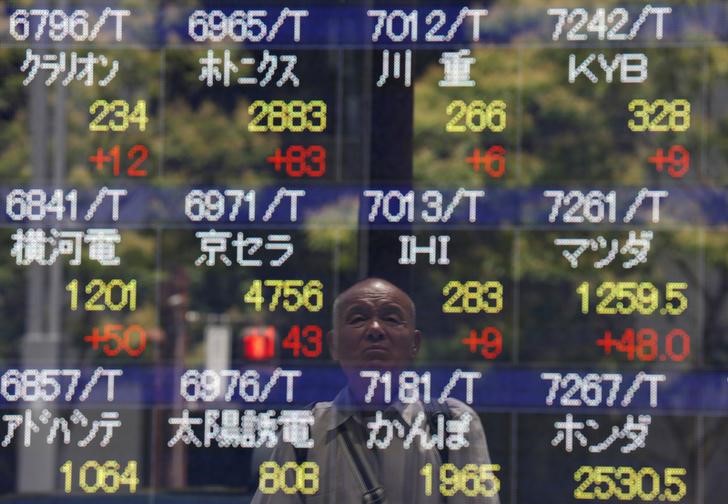By Vidya Ranganathan and Nichola Saminather
SINGAPORE (Reuters) – This year’s rally in emerging Asian equities and bonds is gathering steam again, shrugging off the Brexit jolt, but there is one difference: Investors are more jittery, particularly over political and currency risk. And that would mean the slightest provocation on events ranging from China’s growth and currency to the election in the United States could make investors in stocks and bonds extra jumpy.
The good news for Asia is that three weeks after the Brexit vote, its markets are on a firm footing. In some ways, its investment landscape looks strikingly similar to the first half,with attractive stock markets and high-yielding bond markets. Between June 23, day of the Brexit vote, and July 6, foreign investors bought a net $107 million of Asia-Pacific equities, according to data from Jefferies. By contrast, there were net sales of $9.3 billion in developed Europe and $8.7 billion in the U.S. Local currency-denominated bonds have rallied on expectations of the Federal Reserve keeping monetary policy loose for much longer, and spreads on Asian dollar debt have tightened.
At the same time, Asia’s currencies have weakened, aligning with expectations of dollar strength as well as a falling Chinese yuan.
“Emerging equities, including Asia, have been relatively protected because this is a developed markets mess-up this time,” said Daniel Morris, senior investment strategist at BNP Paribas Investment Partners in London. “The risk to emerging markets, if there is one, is going to come through the dollar.” China’s yuan has fallen 2.9 percent against the dollar this year, making it Asia’s worst performer. Weakness could be sustained if the slide encourages capital outflows and if Chinese authorities are seen tolerating a cheaper yuan. “We worry that it might be a short distance to when this trend in the renminbi starts to compound the negativity on risk, and trigger concerns from markets and policymakers of possibly another round of self-fulfilling renminbi weakness,” Deutsche strategist Sameer Goel said in a note to clients. Likewise, analysts at Bank of America Merrill Lynch say while Brexit is a Europe-focused growth shock that still favors higher-yielding emerging market assets, there are tail risks including the pace of China’s capital outflows. BofAML is therefore avoiding exposure to emerging market currencies. “The recent rally in dollar-yuan which the market has so far treated as benign could easily turn into a destabilizing factor,” they wrote last week. GREATER VULNERABILITY
While Asia in general has shown resilience post-Brexit vote, markets such as India and Indonesia, with limited exports to Britain and Europe, are more in favor than ones more open and vulnerable to global demand such as Taiwan, Hong Kong and Singapore. John Woods, Asia-Pacific chief investment officer at Credit Suisse, said in a briefing early this month that Southeast Asian markets “would derive relief as lower for longer U.S. rates would ease pressure on Southeast Asian currencies and provide room for policy easing.” The trajectory of China’s slowing economy and its currency remain the elephant in the room.
“The drama of Brexit has distracted investors from worries of a more severe slowdown in China’s growth as earlier policy easing is exhausted and the Chinese yuan’s stealth depreciation,” David Riley, head of credit strategy at Blue Bay Asset Management, wrote on July 4. Barring a China shock, fund manager Matthews Asia believes the growth eluding Europe remains intact in Asia.
“While we don’t yet know what the long-term ramifications are for Europe and the U.K., we can be a little more certain about the future for Asia’s economy and its growing contribution to global growth,” David Dali, Matthews client portfolio strategist wrote on June 27. (Editing by Richard Borsuk)
Investors retain bets on Asia despite chance of more Brexit volatility

By Vidya Ranganathan and Nichola Saminather
















